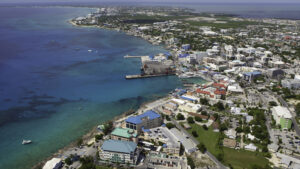Overview

The Cayman Islands is a self-governing British Overseas Territory, the largest by population, in the western Caribbean Sea. The 264-square-kilometre (102-square-mile) territory comprises the three islands of Grand Cayman, Cayman Brac and Little Cayman, which are located to the south of Cuba and northeast of Honduras, between Jamaica and Mexico’s Yucatán Peninsula. The capital city is George Town on Grand Cayman, which is the most populous of the three islands.
The Cayman Islands is considered to be part of the geographic Western Caribbean Zone as well as the Greater Antilles. Due to its convenient location in the Caribbean, it allows for ease of business travel to the United States, United Kingdom, Canada and other parts of the world.
The first recorded permanent inhabitant of the Cayman Islands was on Grand Cayman around 1661.
England took formal control of the Cayman Islands, along with Jamaica, as a result of the Treaty of Madrid of 1670. On 22 June 1863, the Cayman Islands became officially declared and administered as a dependency of the Crown Colony of Jamaica. The islands continued to be governed as part of the Colony of Jamaica until 1962, when they became a separate Crown colony while Jamaica became an independent Commonwealth realm.
In the 1950s, tourism began to take off with the opening of Owen Roberts International Airport in 1952, a bank and several hotels, plus a number of scheduled flights and cruise stop-overs.
Politically the Cayman Islands were an internally self-governing territory of Jamaica from 1958 to 1962; however, they reverted to direct British rule following the independence of Jamaica in 1962. In 1972, a large degree of internal autonomy was granted by a new constitution, with further revisions being made in 1994. The Cayman Islands government focused on boosting the territory’s economy via tourism and off-shore finance, both of which mushroomed from the 1970s onwards. The Caymans have historically been a tax-exempt destination, and the government has always relied on indirect and not direct taxes. The territory has never levied income tax, capital gains tax, or any wealth tax.
The economy of the Cayman Islands is dominated by financial services and tourism, together accounting for 50-60% of Gross Domestic Product. The nation’s low tax rates have led to it being used as a tax haven for corporations; there are 100,000 companies registered in the Cayman Islands, more than the population itself. Foreign policy is controlled by the United Kingdom, as the islands remain an overseas territory of the United Kingdom. Although in its early days, the Cayman Islands’ most important relationships were with Britain and Jamaica, in recent years, as a result of economic dependence, a relationship with the United States has developed.
No direct taxation is imposed on residents and Cayman Islands companies.
The office of Intershore Consult is located at George Town Financial Centre, Intershore Suite 303, 90 Fort Street, P.O. Box 2002, KY1-1104, George Town, Grand Cayman. Intershore is a Corporate Service Provider licenced and regulated by the Cayman Islands Monetary Authority of Six, Cricket Square, Grand Cayman KYI-1001, Cayman Islands, P.O. Box 10052, ContactFiduciary@cima.ky, Tel:+3450949-7089, www.cima.ky.
